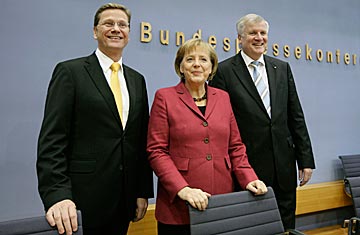
German Chancellor Angela Merkel stand with members of the new ruling coalition, German Free Democratic Party chairman Guido Westerwelle, right, and Bavaria's Christian Social Union chairman Horst Seehofer.
Germany's new coalition government put the finishing touches to its policy program this weekend, promising moderate tax cuts to help support the economy, a reduction in the length of compulsory military service, and the continued operation of the nation's aging nuclear power plants. No big surprises there. But one detail could have interesting international repercussions: the man designated to be foreign minister, Guido Westerwelle, is pushing for the U.S. to remove its remaining nuclear weapons from German soil.
"We want the last nuclear weapons that are stationed in Germany to be taken away," Westerwelle said at the conclusion of the coalition talks on Saturday. The U.S. doesn't disclose the exact number of nuclear warheads it still keeps in Germany, a legacy of its Cold War policy that dates back to the 1950s, and which made western Germany the frontline of its Soviet containment strategy. But German sources estimate there could be as many as 20 nukes still in the country.
The senior partners in the coalition are Chancellor Angela Merkel's Christian Democratic Union (CDU) and its Bavarian sister party, the Christian Social Union (CSU). Westerwelle heads the junior coalition party, the Free Democrats, and campaigned primarily on economic and finance issues. He was forced to scale back his demands for deep tax cuts in the coalition talks, and his demand to turn Germany into a nuclear weapon-free zone may have been agreed partly to assuage the sting of compromise. Merkel said that she would be seeking the withdrawal within the context of NATO, rather than as a unilateral measure. "We don't want to act in this matter on our own," she said.
The coalition agreement took three weeks to cobble together, and is expected to be signed on Monday. Tax cuts were the key area of conflict. In the end, the parties agreed on a reduction totaling 24 billion euros ($36 billion). Among the beneficiaries will be small businesses, families and people inheriting money from their parents. The government is also planning to reform its health insurance system from 2011, shifting more of the financial burden on the public via direct premium payments.
The new designated finance minister is an old government hand, Wolfgang Schaeuble, who long served as a powerbroker in the CDU and was a close adviser to former Chancellor Helmut Kohl. He has been wheelchair-bound since an assassination attempt in 1990.
The man chosen to be defense minister is a rising star of the CSU, Karl-Theodor zu Guttenberg. Unlike Westerwelle, who comes to the Foreign Ministry little known outside Germany and with clunky English, zu Guttenberg is already a familiar, even reassuring, figure in Washington. There's comfort for Washington too in the coalition position on Afghanistan. The agreement explicitly states that Germany's military involvement in Afghanistan is in the German national interest.
